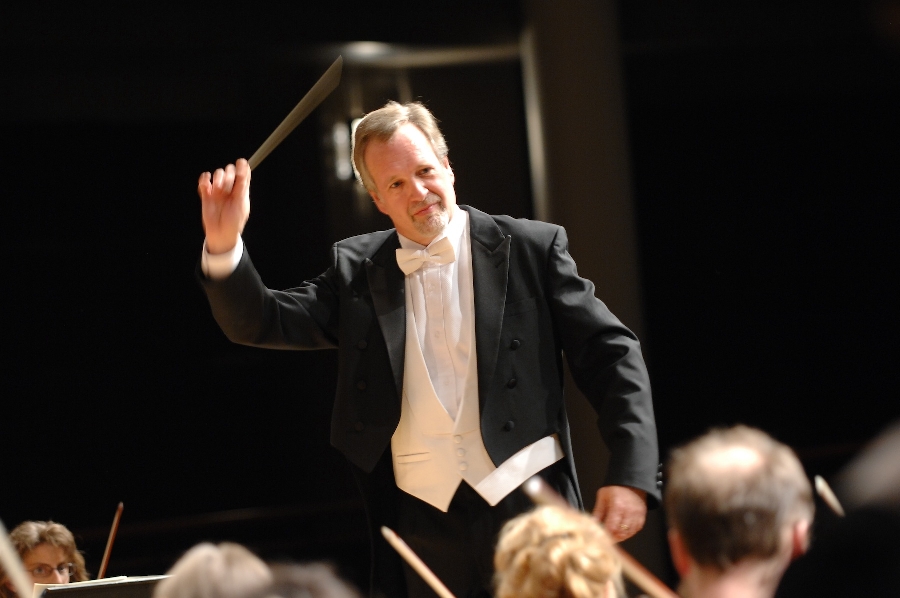
When death knocks and shocks our soul to its “final resting place,” it’s often said to be cruel and untimely. In the case of the seemingly immortal Maestro Richard Rintoul, there are far deeper truths at play.
Yet, I am still profoundly saddened, especially for his magnificent wife and musical soulmate, Lynette Rintoul. She was confronted with Richard’s sudden death, which came sometime in his sleep during the waning hours of Thanksgiving night. That’s when the rhythms that rhymed his respiration and pulsed his heart came to a gentle end.
But those who were touched by Richards’s music making and mentorship know that his great spirit will never come to a complete halt. It will continue to beat time in our hearts and souls just as he did as a symphony conductor and violinist/violist. Richard also left his rhythmic stamp as a master teacher at UCSB, where his contribution to increasing the musicianship and professionalism of its orchestra is widely acknowledged, and, more recently, at Westmont College.
Richard’s relationship to rhythms and rests, whether those infusing his 62 physique or the musical scores he conducted and played, always did extend beyond the batons, bows, and body he has now left behind. Like the restless rhythms of his beloved Beethoven, Richard’s now no doubt dance in the cosmos as he continues to improvise on his own unique theme from eternity (as anyone who’d attended his Halloween affairs can attest). In fact, rhythm and timing were so important to Richard that not only did he have a near-devotional commitment to reproducing the composers’ stated tempi when he conducted their works or coached a student, but he also considered rhythm the fundamental prime of music — not pitch, melody, or harmony, as most Western musicologists assert.
That’s why his death, though unexpected, can be seen within the rhythmic time signature of his own meaningful, musical life-presence — one he saw extending through many earthly reincarnations. Similarly, he saw conducting as a form of “telepathy” extending beyond the body and felt by the orchestra, and that being conscious of this energetic presence helped everyone, including the audience, “be in time together” — one of music’s special powers. That’s why he stressed physically feeling and cueing key orchestral parts just ahead of time — so musicians would always “come in on time.” He believed that when we do music at its best, we create an energetic beauty that has a ripple effect throughout the universe, like his presence now.
He even half-jokingly told me that what he attempted to do musically was akin to being “on the frontlines in the war on ugliness and evil.” Jokes aside, he did seriously hope to collaborate with others of like mind to help transform society and the cosmos through music. He especially appreciated Beethoven as someone who, despite the ugliness of his own personal life and deafness, created a beauty transcending time and space, one that, 200 years later, still moves humanity’s heart. In fact, Richard’s doctoral dissertation was on Beethoven’s Ninth Symphony. While it was an “ode to joy,” his thesis was also a perfectionist’s labor of love that consumed nearly a decade of his life — a fate he warned me against as I navigate the “wine-dark sea” of my own doctoral odyssey in social brain science.
He also warned never to underestimate the potential triteness of those who might hold in their hands the life or death of my career in academia, to which I responded, “and never underestimate the ability of others to underestimate you.” He laughed but was also self-reflective, sharing how he had to continuously manage his expectations of excellence, especially when working with orchestral musicians. He coached his conducting students on how to consider the emotions of musicians when giving feedback, and encouraged us to coach him when he failed to live up to his own standards. Richard’s ode to Beethoven is a part of the legacy of love he left to those lucky enough, like myself, to have been recipients of it. The rippling rhythms of energetic beauty Richard spoke of, and created, have merged ever more closely with those of Beethoven, who also died in his 57th year.
Richard was both a mentor and musical soul brother to me. I learned how to conduct from him — something I’d dreamed of doing since I was 5 years old and first saw Lenny Bernstein’s televised Young People’s Concerts. Richard not only saw those same telecasts but was mentored by Bernstein. Richard helped me fulfill my dream by allowing me to take his conducting class at UCSB in the fall of 2010, and, for my final exam, to conduct a UCSB pick-up ensemble in the second movement of Beethoven’s Fifth Symphony. In preparation for the exam, I shared with Richard an inspiration I had about Beethoven that he also resonated with — that Beethoven was expressing a fundamental spiritual truth in the main motif of the second movement, which I heard as follows:
“By— our — Love — we — are — Gods.”
I believe that was Richard’s message and gift to us, too — that we cherish ourselves, each other, life, its many gifts, and especially music. May I help bring it forth now more than ever. Amen.
For more testimonials, pictures, and videos, please see the wonderful online tribute to Richard here.
